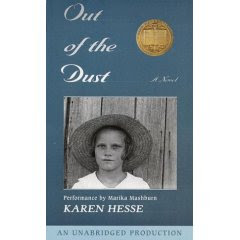Saturday, August 14, 2010
Extra Credit #4: American Born Chinese
Extra Credit #3: Whirligig
In mediation, Lea’s mother asks just one thing of Brent, that he create 4 whirligigs and place them in the 4 corners of the United States. She gives him a 45 day Greyhound bus pass and Brent is off on the adventure.
From Seattle to San Diego, Florida to Maine, Brent travels all over meeting many interesting people and having the opportunity to spend hours thinking about what he did to Lea and how perhaps his life isn’t worth wasting. In all his travels Brent regains a hold on how much he loves his life, how precious the life of Lea was that he took away, and how much he has to look forward to.
I believe this would be a good book for teenagers who are dealing with fitting in issues, new schools, and the wanderlust that so many teenagers have. It's a calm, gentle book about the importance of life and of how much bigger the world is beyond your home.
Genre: coming of age
10. Flipped
Monday, July 26, 2010
9. Eagle Blue
Monday, July 19, 2010
8. The Chocolate War
Wednesday, July 14, 2010
Extra Credit #2: Incantation
Extra Credit #1: Thirsty
7. When it Happens
Monday, July 5, 2010
6. Paper Towns
Sunday, June 20, 2010
5. The Midwife's Apprentice
4. Jack London: A Biography
Monday, June 14, 2010
3. A Dance for Three

Plummer, Louise. A Dance for Three. New York: Delacorte Press, 2000.
Monday, June 7, 2010
2. Out of the Dust

Hesse, Karen. Out of the Dust. New York: Scholastic, 1997.
Friday, May 21, 2010
1. Looking for Alaska

Genre category: Coming of Age Fiction, Search for Identity, 2006 Printz Award
Annotation: When 16 year old Miles Calvary leaves his home to attend boarding school, he finds that not only are his new classmates different, but his whole world outlook is about to change.
Justification for nomination: This book would resonate with any teen who doesn't feel like they fit in with their classmates. Miles Calvary feels alone in his school and decides to go to boarding school to "seek the Great Perhaps". His roommate, the Colonel, comes from a background of poverty and is a genius. The Colonel's best friend, Alaska Young, is good looking, smart, and well-read and Miles immediately falls in love.
Miles becomes part of this misfit group---the group of kids from poorer backgrounds who are not "weekend warriors" (rich kids who go home on weekends). It's an us vs them mentality, which frequently comes through in the form of pranks and conversation.